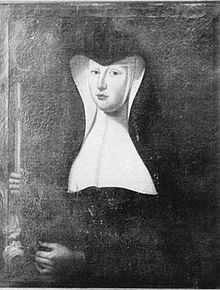Eibingen Abbey

Eibingen Abbey (in German Abtei St. Hildegard, full name Benedictine Abbey of St. Hildegard) is a community of Benedictine nuns in Eibingen near Rüdesheim in Hesse, Germany.
The original community was founded in 1165 by Hildegard von Bingen. This was the second community founded by her. It was dissolved at the beginning of the 19th century during the secularization of this part of Germany.
The present community was established by Charles, 6th Prince of Löwenstein-Wertheim-Rosenberg in 1904 and re-settled from St. Gabriel's Abbey, Bertholdstein. The nunnery belongs to the Beuronese Congregation within the Benedictine Confederation.
In 1941, the nuns were expelled by the Nazis; they were not able to return until 1945.
In 1988, the sisters founded Marienrode Priory at Hildesheim, which became independent of Eibingen in 1998.
The nuns work in the vineyard and in the craft workshops, besides undertaking the traditional duties of hospitality. They can be heard (but not seen) singing their regular services.
The abbey is a Rhine Gorge World Heritage Site.[1] The church has been used for concerts of the Rheingau Musik Festival, such as a "BachTrompetenGala" with Edgar Krapp, organ.[2]
Abbesses

- Hildegard of Bingen (1098-1179) first abbess and founder of the community
From 1603 the abbesses held the title of "Abbess of Rupertsberg and Eibingen".
- Kunigunde Frey von Dehrn, abbess around 1600
- Anna Lerch von Dirmstein, abbess until 1666
- Kunigunde Schütz von Holtzhausen, abbess from 1666 to 1669
- Scholastica von Manteuffel, abbess from 1670
- Maria Antonetta Mühl zu Ulmen, abbess from 1711
- Philippine zu Guttenberg, last abbess from 1790 to 1804. The convent was finally disestablished in 1814. After the Reichsdeputationshauptschluss (German mediatization) the land once owned by the convent became part of the domains of the prince of Nassau-Weilburg who, in 1831, even bought both the monastery and its church.
Since the re-establishmen of the community in 1904 there have been four abbesses and one prioress:
- Regintrudis Sauter, abbess from 1908 to 1955
- Fortunata Fischer, abbess from 1955 to 1978
- Edeltraut Forster, abbess from 1978 to 1998
- Gisela Happ, prioress from 1998 to 2000
- Clementia Killewald, abbess from 2000
References
- ↑ The Abbey of St. Hildegard on the World Heritage website
- ↑ Abtei St. Hildegard, Eibingen on the Rheingau Musik Festival website (German/English)
External links
| Wikimedia Commons has media related to Kloster Eibingen. |